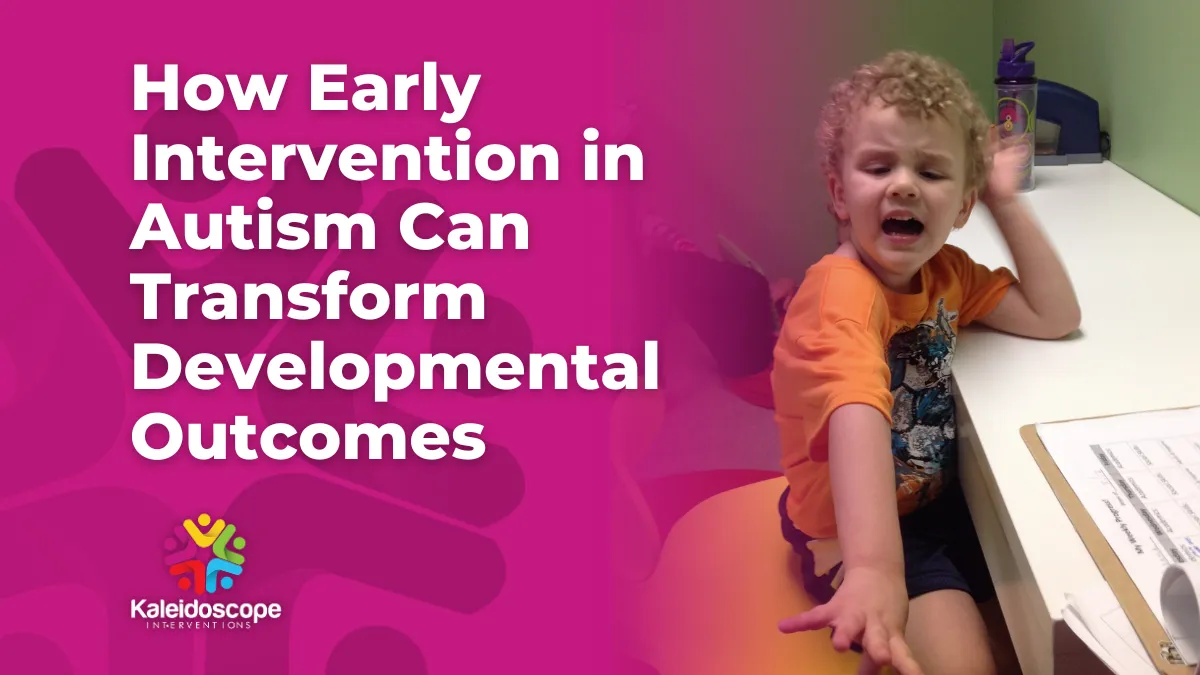ABA therapy at home offers children with Autism Spectrum Disorder (ASD) the unique advantage of learning essential skills in a familiar and comfortable environment. By bringing Applied Behavior Analysis (ABA) directly into the home, therapy sessions can be customized to address each family’s specific routines, challenges, and strengths, creating a more meaningful impact.
This personalized, hands-on approach allows therapists to work closely with families, guiding them in supporting their child’s progress beyond therapy sessions. In-home ABA therapy strengthens the bond between child and caregiver and fosters lasting communication skills, socialization, and independence, empowering children to navigate their daily lives.
Choosing the Right Autism Therapy Providers for In-Home Support
Selecting the right autism therapy provider for in-home support is essential to ensuring that your child receives quality care in a comfortable environment. In-home ABA therapy requires a provider who is both knowledgeable and sensitive to the unique dynamics of working within a family’s daily routines.
Qualifications and Experience
The qualifications and experience of autism therapy providers play a vital role in the success of in-home ABA therapy. Look for providers with specific credentials and proven expertise with children with Autism Spectrum Disorder (ASD) who are well-versed in Applied Behavior Analysis (ABA) principles.
- Certified ABA Professionals: Seek providers who employ Board Certified Behavior Analysts (BCBAs) and Registered Behavior Technicians (RBTs), as they have specialized training in ABA methods.
- Experience with In-Home Therapy: Choosing providers with expertise specifically in home-based therapy is beneficial. Working within a home setting presents unique opportunities and challenges, so a provider experienced in this area can be more adaptable.
- References and Success Stories: A reputable provider should be able to share testimonials or case studies that demonstrate their effectiveness in helping children achieve meaningful progress.
Choosing a qualified and experienced provider can give you peace of mind and help your child receive the best support tailored to their needs.
Compatibility with Family Values and Routines
In-home therapy works best when the provider respects and is compatible with the family’s values and daily routines. Since ABA therapy often requires close collaboration with caregivers, a good provider will prioritize clear communication and seek to understand each family’s unique dynamics.
- Respect for Family Culture and Values: A provider who respects your family’s values, schedules, and beliefs is more likely to create a positive, cohesive environment for therapy.
- Flexibility in Session Timing: In-home providers should offer flexibility in scheduling sessions to align with the family’s daily routine, making it easier for the child to transition smoothly into and out of therapy activities.
- Commitment to Caregiver Involvement: Effective providers actively involve caregivers in therapy, providing them with tools and techniques to support skill-building outside sessions.
Finding a provider who values your family’s input and is flexible with scheduling helps build a trusting relationship, essential for successful in-home therapy.
Transparent Communication and Progress Tracking
Clear communication and regular progress tracking are critical components of successful in-home ABA therapy. Families benefit from providers who are open about therapy goals, methods, and progress updates, as this transparency fosters trust and partnership.
- Detailed Therapy Plans: Look for providers who offer clear, individualized therapy plans with measurable goals. These plans will allow you to see how your child’s progress aligns with these objectives.
- Regular Progress Reports: Effective providers offer consistent updates on progress, sharing insights on successes, challenges, and any necessary adjustments to the approach.
- Open Communication Channels: A good provider encourages ongoing dialogue, making it easy for families to ask questions, discuss concerns, and stay engaged in their child’s progress.
By choosing a provider committed to transparent communication and accountability, families can better support their child’s progress and stay informed about their developmental journey.

How ABA Intervention at Home Enhances Consistency and Skill Building
ABA intervention at home provides a consistent and personalized approach to helping children with Autism Spectrum Disorder (ASD) develop essential skills. By bringing therapy into a child’s everyday environment, ABA at home allows for more natural learning opportunities, supporting skills transfer from therapy sessions to real-life situations. In-home ABA offers a stable skill-building framework, creating more impactful and lasting progress.
Consistent Reinforcement in Familiar Surroundings
One of the greatest advantages of ABA intervention at home is the ability to provide consistent reinforcement in a familiar setting. Children in a comfortable environment are often more receptive to learning and practicing new skills. Consistency is crucial for children with ASD, as it strengthens the likelihood that learned behaviors will become habitual.
- Routine-Based Learning: ABA at home can integrate skill-building into everyday routines like mealtime, play, and bedtime, helping children learn in a natural context.
- Reduced Anxiety: Being at home reduces environmental stressors, making it easier for children to focus on learning rather than adjusting to an unfamiliar setting.
- Family Participation: In-home therapy encourages family members to participate, reinforcing skills throughout the day and week.
This consistent reinforcement boosts the child’s confidence and helps them apply their skills in real-world situations.
Personalized Skill-Building in Real-Life Contexts
In-home ABA therapy enables a more personalized approach to skill building. Since every child has unique strengths and challenges, ABA intervention at home can be customized to address specific goals within the context of daily life. This customization allows therapy to have an immediate impact, helping children progress with practical skills relevant to their everyday experiences.
- Tailored Skill Focus: ABA at home can target skills that directly improve a child’s daily routine, like communication during family meals or social interactions with siblings.
- Naturalistic Teaching: Skills are taught in a way that blends with real-life contexts, making it easier for the child to understand how and when to apply what they’ve learned.
- Immediate Application: Children can immediately practice newly acquired skills in meaningful situations, reinforcing learning and enhancing understanding.
Personalized skill-building in the home setting makes ABA intervention more effective. It helps children develop functional abilities that positively influence their independence and interaction within the family.
Strengthening Family Involvement and Skill Reinforcement
In-home ABA therapy is unique in its ability to involve families in the therapeutic process. It helps parents and caregivers learn approaches to reinforce skills outside of sessions. When families actively engage in therapy, children benefit from greater consistency and support in their learning journey.
- Caregiver Training: ABA providers work with caregivers to teach strategies for supporting the child’s skills, enabling caregivers to reinforce learning throughout the week.
- Regular Family Check-Ins: Therapists hold regular check-ins with family members to discuss progress, challenges, and adjustments and ensure alignment with therapy goals.
- Empowering Siblings and Family Members: Siblings and other family members can also be included in the learning process, enhancing social skills and helping build positive family interactions.
By actively involving the family, ABA intervention at home strengthens skill retention and encourages children to generalize behaviors across various situations and people. This approach fosters a collaborative setting where everyone contributes to the child’s development, creating a solid foundation for consistent progress.

The Role of Applied Behavior Analysis Services in Family-Centered Autism Care
Applied Behavior Analysis services play an essential role in family-centered autism care by creating a cohesive, supportive environment involving every family member in a child’s progress. Family-centered ABA therapy focuses on the child’s developmental goals and equips caregivers with tools and strategies to support learning and growth in daily life. This collaborative approach helps create a consistent, nurturing environment that accelerates skill development and builds confidence for the entire family.
Empowering Families Through Caregiver Training
A significant component of family-centered ABA services is caregiver training. When families understand the principles of ABA and the techniques used in therapy, they can better support their child’s progress outside of structured sessions. Caregiver involvement allows for continuous learning and reinforcement, crucial for skill retention and generalization.
- Understanding ABA Techniques: Caregivers learn about positive reinforcement, prompting, and modeling, which enables them to reinforce therapy goals throughout the day.
- Building Confidence: Training helps caregivers feel empowered to handle challenging behaviors and support skill development, creating a more harmonious and supportive home environment.
- Consistent Practice: By applying ABA strategies regularly, caregivers help children transfer skills across various settings, enhancing the therapy’s effectiveness.
Caregiver training strengthens the child’s development and fosters a sense of teamwork, empowering families to contribute actively to their child’s success.
Creating a Supportive Environment for Skill Generalization
ABA services in a family-centered model emphasize skill generalization, which means helping children apply what they’ve learned in therapy to various settings and with different people. Family-centered ABA services involve real-life applications, supporting the child in adapting skills across home, school, and community settings.
- Real-World Scenarios: ABA providers create activities based on everyday routines, like grocery shopping or playdates, helping children practice social skills and adaptive behaviors.
- Encouraging Independence: Skills learned in therapy, such as communication and self-care, are gradually integrated into the child’s daily life, promoting independence.
- Family Interaction: ABA therapy may involve siblings or extended family members, enhancing the child’s ability to use skills in diverse social situations.
Through this approach, ABA services create a practical foundation for skill generalization, helping children feel more capable and confident in real-world situations.
Regular Communication and Progress Monitoring
Family-centered ABA services prioritize open communication and progress tracking, enabling families to stay informed and engaged in their child’s therapy journey. Regular updates and feedback from ABA providers ensure the therapy aligns with the family’s needs and goals, building a transparent and collaborative experience.
- Ongoing Feedback: Families receive regular updates on their child’s progress, with specific examples of achievements, challenges, and areas for improvement.
- Setting New Goals: ABA providers and families work together to set new goals based on the child’s progress, ensuring the therapy remains relevant and targeted.
- Addressing Family Concerns: Providers create a safe space for families to discuss any questions or concerns, adapting therapy approaches to continue aligning with the family’s expectations.
ABA services help build trust and partnership by fostering open communication and ensuring families feel confident and supported throughout therapy.
Conclusion
ABA therapy at home is a powerful, transformative approach to autism care that brings learning, growth, and meaningful progress into a child’s most familiar environment. By involving the whole family, in-home ABA creates a supportive, engaging setting where children can confidently build essential skills in communication, socialization, and independence. With dedicated autism therapy providers, personalized interventions, and the family’s active involvement, in-home ABA therapy offers a pathway to lasting developmental success.
Ready to explore how ABA therapy at home can benefit your child? Reach out today to learn more! Contact us here or call (321) 345-4232. Let’s work together to create a brighter future!


